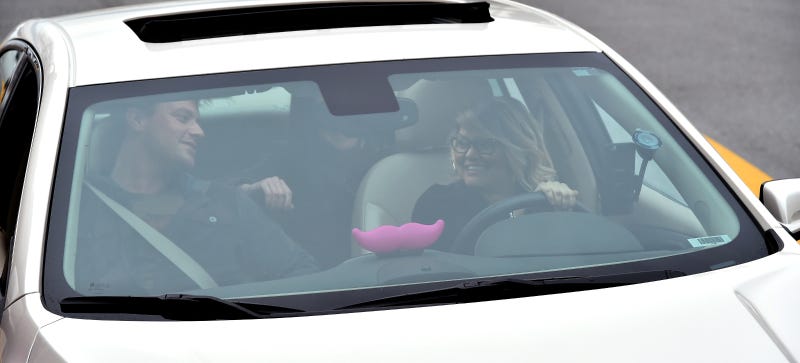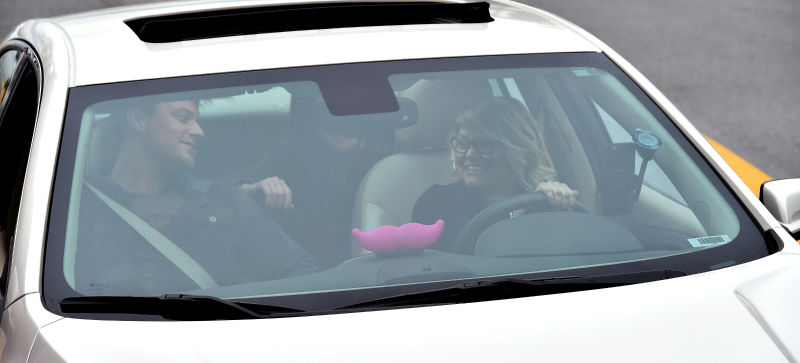
In Austin, a political action committee completely funded by ride-hailing services Uber and Lyft threw an $8 million temper tantrum over regulations the city council wants to enact on ride-hailing. It’s turned into one of the most contentious and aggravating elections the city has ever seen. The worst part is neither side should be trusted on this issue at all.
http://jalopnik.com/ride-hailing-c…
(Full disclosure: I drove for Uber in 2014 as part of a co-promotion for a local track day group. I only made a couple hundred bucks, but it’s worth noting, anyway. I am not currently driving for any ride-hailing services, in fact, I’d rather both leave me alone.)
Advertisement
At issue here is background checks for these ride-hailing drivers. If Austinites vote to pass Proposition 1, Uber and Lyft drivers will not be required to pass a fingerprint-based criminal background check, in addition to the standard background checks they must already pass. The fingerprinting is meant to curb some of the high-profile sexual assaults and other crimes perpetrated by drivers against passengers, as has been reported in Austin and other cities.
If Proposition 1 fails, drivers will have to undergo fingerprint background checks as well. Both Uber and Lyft have instructed their drivers that they will exit the Austin market on Monday morning if the fingerprint checks are implemented, per Austin Business Journals.
Sponsored
The services claim that the fingerprinting requirement in particular will make it harder for them to sign up drivers. The fewer drivers there are to meet demand, the more prices will have to go up to compensate, and the longer delays there will be for a ride.
There are also a couple other items Uber and Lyft would like to overturn in their favor. If it doesn’t pass, drivers will be banned from stopping for passengers in lanes of traffic, cars will be forced to identify that they’re in-use for the service, and several other options for paying their annual fee to the city. These, too, have the potential to cost ride-hailing companies extra cash to operate in Austin.
Neither Side Actually Cares About Austin
Like most elections, there’s more going on under the surface.
On one side, we have a city council where many representatives received campaign backing from the taxi industry—an industry which would like to see their new app-based competition go the way of the dodo.
Advertisement
On the other side, there’s a proposition to overturn several recent city regulations written by the Ridesharing Works for Austin PAC, a PAC that has been entirely funded by Uber and Lyft, according to KUT. That proposition, Proposition 1, is the only thing Austinites are voting on today.
This choice is beyond asinine. One industry should not be allowed to push through less favorable conditions for their competition. Likewise, no industry should be in the business of cherry-picking favorable regulations for itself via over-spending, over-campaigning, and threatening to rage-quit an entire metropolitan area, either.
Exacerbating the frustration with this choice is the fact that most of the people I know use ride-hailing services. They tend to be cheaper, cleaner and easier to use than cabs, which are fairly sparse in Austin anyway. (Public transit in Austin is a joke as well.)
So Uber and Lyft been a godsend to this city, especially by making it easier than ever for the denizens of the drinking capital of Texas set to get home without getting behind the wheel of their own cars.
It’s worked—the number of DWI crashes has dropped since Uber entered the Austin market, according to Politifact. While it’s true that updated DWI crash figures released by the Austin Police Department Thursday show less of a drop than the Ridesharing Works for Austin PAC claims, per the Austin American-Statesman, a 12-percent drop in 2014 isn’t insignificant.
If the city won’t invest in the proper infrastructure for widespread, easy-to-use public transit to keep drunken revelers out of cars, we really shouldn’t moan when private companies step in to fix the problem. Yet, here we are.
I’ve actually been for Proposition 1 despite having read the measure itself (against an Uber representative’s urging, no less), but now I’m so annoyed by that campaign’s heavy-handed tactics that I’ll have to hold my nose while I vote for it. The last thing I want is for my vote to be misconstrued as an approval of Uber and Lyft’s rude, tactless campaign.
While I’m in favor of working out safer solutions for dropping off and picking up passengers, and some small means of car identification would be nice to have, those sensible measures the city wants have been lumped in on Proposition 1 with a couple others that don’t make sense.
It’s in the ride-hailing companies’ best commercial interest to provide a safe service, so I’m unconvinced of the need for the city to mandate an extra fingerprinting step. If customers feel as if the lack of fingerprinting makes these services unsafe, another service (or even the cab companies themselves, which already require background checks with fingerprints) can step in and dominate the market. At that point, Uber and Lyft will either have to change or die.
City Council: Approved By The Cab Companies
Let’s not forget where the move to further regulate ride-hailing companies came from in the first place: Austin’s city council. Council members received just shy of $54,000 in campaign donations from the taxi industry for their last election cycle in 2014, per the Austin American-Statesman:
Over the last three years, taxi drivers, shuttle service providers and top executives at cab companies have plowed nearly $54,000 into the campaigns of City Council members.
In this election cycle, cab company executives bundled at least $18,500 in donations to the mayoral campaign of Council Member Mike Martinez, and taxi cab employees, spouses and attorneys contributed nearly $5,000 to Council Member Kathie Tovo. Tovo is running for re-election in the newly created District 9 in Central Austin against Council Member Chris Riley, the main sponsor of the ordinance legalizing Uber and Lyft.
Sure, that’s pocket change compared to the $8 million Uber and Lyft have spent on the Proposition 1 election, but it’s far more in line with Austin’s usual local election spending.
Likewise, the Our City, Our Safety, Our Choice group in opposition to Proposition 1 has only raised just a little over $100,000 in funds, per KUT—$90,000 of which came in the last month as Uber and Lyft started irritating an entire city to death over Prop 1.
The Statesman notes that Uber and Lyft donated nothing directly to the council members’ individual election campaigns. However, they hired several lobbyists who had already started to send emails to council members and hold pro-ride-hailing rallies in front of council meetings in 2014.
Uber even briefly added a horse-and-buggy service called “Kitchen’s Uber” in protest of the stricter regulations proposed by councilwoman Ann Kitchen, writes AustinInno, as Uber claimed the measures would set transportation back in time.
I’m certain the city council must be just as annoyed as we are at this point, so I’m not surprised that Uber and Lyft’s particular style of lobbying didn’t win them any favors.
One of the options a ride-hailing company could use to fulfill their annual fee should Proposition 1 fail gives away just how one-sided our council seems to be on this issue. The council suggested that a ride-hailing company could pay a full cab permit for each driver to fulfill that fee.
That’s unreasonable, as many ride-hailing drivers do it as a part-time gig. According to the Austin American-Statesman, that cab permit fee was $450 in 2015, which is far more than I ever made the time I putted around as an Uber driver.
At its heart, this is an ugly, industry vs. industry fight. No one wants corporate entities writing the rules for their own benefit, be it the established taxi industry, Uber or Lyft. As such, neither solution presented by a “yes” or “no” on Proposition 1 is ideal.
Requiring drivers who clearly have their own means of transportation to get out and get fingerprinted really isn’t that huge of a deal. However, it’s one more thing to do in order to register for the service, particularly if you have to work that extra appointment around your other responsibilities, such as a full-time job. So, I see their point, sans their histrionics about it.
However, because these companies are apparently run by disgruntled tech industry man-babies, Uber and Lyft say they’re just going to take their ball and go home if they don’t get their way.
It’s not an idle threat. Lyft pulled out of Houston due to tighter ride-hailing laws passed in 2014, and the Austin American-Statesman reports that Uber is now fighting Houston’s fingerprinting requirement.
For Austin’s sake, I hope both companies stay here regardless—after swallowing big pieces of humble pie, that is. Alternate ride-hailing solutions aren’t as polished yet, so unfortunately, losing these two insufferable companies would have a negative effect—especially after last call.
Maybe something good will come out of this, though. Uber has been sued for allegedly robo-texting users to get to the polls, reports the Statesman. If they still serve the area but get punched in the balls somehow for interrupting my day with unwanted calls and texts, that’s a win-win situation.















